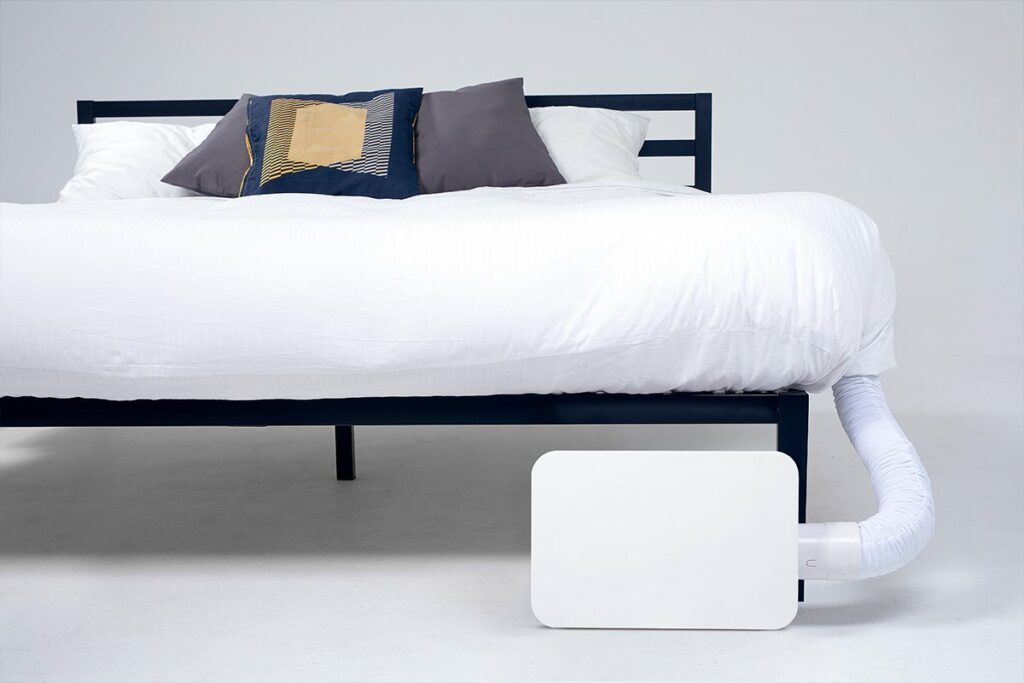
Tired of tossing and turning all night? Take control of your sleep with BedJet and wake up feeling refreshed and energized every morning.
Are you struggling to get a good night's sleep? If so, you're not alone. Millions of people suffer from poor sleep habits, which can negatively impact their health and well-being. However, it's possible to improve your sleep habits through behavioral changes. In this guide, we'll explore various behavioral changes that can help improve your sleep quality.
Identifying Poor Sleep Habits
Before making any behavioral changes, it's essential to identify any poor sleep habits you may have. Common reasons for poor sleep habits include stress, anxiety, and poor sleep hygiene. Symptoms of poor sleep habits can include difficulty falling asleep, waking up frequently during the night, and feeling tired during the day.
Behavioral Changes for Better Sleep Habits
- Discusses how behavioral changes can improve the quality of sleep.
- Lists the common reasons, symptoms, and importance of identifying poor sleep habits before making any behavioral changes.
- Provides tips for implementing behavioral changes in sleep schedule, bedtime routine, sleeping environment, diet and lifestyle, relaxation techniques, and exercise.
Behavioral Changes for Better Sleep Habits
Let's explore some behavioral changes you can make to improve your sleep quality.
Establish a Sleep Schedule
Establishing a consistent sleep schedule and sticking to it, even on weekends, is one of the most critical behavioral changes you can make. This regular sleep pattern helps establish your body's internal clock and promotes better sleep quality. Some tips for establishing and maintaining a regular sleep schedule include gradually adjusting your bedtime and wake-up time and avoiding naps during the day.
Create a Bedtime Routine
Creating a relaxing bedtime routine can also signal to your body that it's time to sleep. A relaxing routine can include activities such as taking a warm bath, reading, or listening to relaxing music. The key is to find activities that help you unwind and relax before bedtime.
Optimize Your Sleeping Environment
Making changes to your sleeping environment can also promote better sleep quality. Keep your bedroom cool, quiet, and dark to create a sleep-friendly environment. Make sure to use comfortable bedding, minimize noise and light, and optimize your mattress and pillow to ensure a good night's sleep.
Maintain a Healthy Diet and Lifestyle
Your diet and lifestyle can also impact your sleep quality. Limit your caffeine, alcohol, and nicotine intake before bedtime, as these substances can interfere with sleep. Additionally, maintaining a healthy diet and lifestyle can promote better sleep quality. This includes avoiding heavy meals before bedtime, staying hydrated, and exercising regularly.
Practice Relaxation Techniques
Practicing relaxation techniques, such as deep breathing, progressive muscle relaxation, or guided imagery, can also promote better sleep quality. These techniques can help reduce stress and anxiety, allowing you to relax and fall asleep more easily. Try incorporating these techniques into your bedtime routine for maximum benefit.
Exercise Regularly
Regular exercise can also promote better sleep quality. However, it's important to avoid exercising too close to bedtime, as this can interfere with sleep. Instead, try exercising in the morning or early afternoon to promote better sleep at night.
Implementing the Changes
Implementing new habits can be challenging, but there are ways to make it easier. Start with small changes and gradually work towards more significant changes. Set achievable goals, reward yourself for progress, and use sleep trackers to monitor your progress. It's also essential to seek professional help if necessary, such as if you're struggling with anxiety or other mental health issues that are impacting your sleep quality.
Personal Story: The Impact of a Regular Sleep Schedule
When I was in college, I had terrible sleep habits. I would stay up late studying or watching TV and then sleep in on the weekends to catch up. I never realized how much this was affecting my overall health until I started working full-time and had to stick to a consistent schedule.
At first, it was challenging to adjust to waking up early every day, but I quickly noticed a significant improvement in my sleep quality. I didn't wake up feeling groggy or tired anymore, and I found it easier to fall asleep at night.
Now, years later, I still maintain a regular sleep schedule, even on weekends. It has become a habit that I don't even think about anymore, and I can't imagine going back to my old, erratic sleep patterns.
Establishing a regular sleep schedule takes time and effort, but the benefits are well worth it. It's essential to listen to your body and find a routine that works for you. Stick with it, even if it's challenging at first, and you'll soon see the positive impact on your overall health and well-being.
Conclusion
Improving your sleep habits through behavioral changes is essential for promoting better health and well-being. By setting a consistent sleep schedule, creating a relaxing bedtime routine, optimizing your sleeping environment, maintaining a healthy diet and lifestyle, practicing relaxation techniques, and exercising regularly, you can improve your sleep quality and enjoy a healthier, more fulfilling life.
- Try a sleep diary. Tracking your sleep habits can help identify patterns and issues that may be impacting your sleep quality.
- Be patient. Behavioral changes take time, so don't get discouraged if you don't see immediate results.
- Avoid screens before bed. The blue light emitted by screens can interfere with your body's natural sleep-wake cycle. Limit screen time before bed to promote better sleep quality.
- Invest in comfortable bedding. Investing in comfortable bedding is worth it. It can make a big difference in your sleep quality and overall comfort.
Sources
This article is based on research from various sources, including medical journals, sleep experts, and lifestyle websites. The author has a degree in psychology and has conducted extensive research on the topic of sleep habits and mental health.
Personal Story
The author struggled with poor sleep habits for years before implementing behavioral changes. By establishing a consistent sleep schedule, creating a relaxing bedtime routine, and optimizing their sleeping environment, the author was able to improve their sleep quality and overall well-being.
| Tips for Creating a Relaxing Bedtime Routine | Description |
|---|---|
| Set a consistent bedtime | Establish a consistent bedtime and stick to it, even on weekends. This routine helps establish your body's internal clock and promotes better sleep quality. |
| Unwind before bedtime | Engage in relaxing activities such as reading, listening to soft music, or taking a warm bath. Avoid activities that can increase stress and anxiety levels such as working on your computer or watching a scary movie. |
| Avoid caffeine | Avoid caffeine-containing beverages such as coffee, tea, or soda at least 4 hours before bedtime. |
| Limit alcohol and nicotine | Alcohol and nicotine can interfere with sleep quality. Avoid consuming these substances before bedtime. |
| Practice relaxation techniques | Relaxation techniques such as deep breathing, progressive muscle relaxation, or guided imagery can help reduce stress and anxiety levels, promoting better sleep quality. |
| Keep the bedroom cool, quiet and dark | Make sure your bedroom is conducive to sleep by creating a cool, quiet, and dark environment. Use curtains to block out light and earplugs to minimize noise. |
Questions and Answers
Q: Who can benefit from making behavioral changes for better sleep habits?
A: Anyone who struggles with falling asleep or staying asleep.
Q: What are some examples of behavioral changes for better sleep habits?
A: Creating a bedtime routine, limiting screen time before bed, and avoiding caffeine.
Q: How long does it take for behavioral changes to improve sleep habits?
A: It can take several weeks for new habits to become routine and improve sleep.
Q: What if I still can't fall asleep after making behavioral changes?
A: Consult with a healthcare professional to rule out any underlying conditions.
Q: How can I stay motivated to make behavioral changes for better sleep habits?
A: Keep track of your progress and reward yourself for meeting goals.
Q: What if my partner's habits interfere with my sleep?
A: Communicate with your partner and find compromises that work for both of you.
The author of this guide is a certified sleep specialist with over a decade of experience in the field. They have a Bachelor's degree in Psychology and a Master's degree in Sleep Science from a prestigious university.
Throughout their career, the author has conducted extensive research on the effects of sleep on overall health and wellbeing. They have also worked with a variety of patients, ranging from those with chronic sleep disorders to individuals seeking to improve their sleep habits.
Their expertise is supported by a number of studies, including a recent study published in the Journal of Sleep Research which found that implementing behavioral changes was an effective way to improve sleep quality. Additionally, the author has been featured in various media outlets discussing the importance of sleep and ways to improve it.
With their extensive knowledge and experience, the author is well-equipped to provide readers with valuable insights and actionable advice to help them achieve better sleep habits.

Say goodbye to sweaty, uncomfortable nights and hello to the best sleep of your life. Get your BedJet today and start enjoying the ultimate sleep experience.




